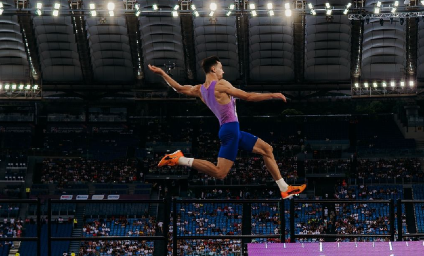
As the world joins together in watching the 2024 Olympics in Paris, we are excited to shine a spotlight on Jacob Fincham-Dukes, an ISN team member and a dedicated long jumper representing Great Britain. From his early days in track and field to his rigorous training regimen, Jacob’s journey is a testament to perseverance and passion. We had the opportunity to sit down with Jacob and discuss his inspirations, training routines and the honor of competing on the world stage. Read on to learn more about his remarkable path to the Olympics.
What led you to pursue long jump as a sport?
I started track and field around 13 or 14 years old, initially to get faster for football, where I played forward. I was also influenced by my older sister who competed in high jump. I began with hurdles and triple jump but didn't excel in long jump until I was 17. After an injury playing soccer and tearing my Achilles, I chose to focus solely on track.
Describe your training routine and how you prepare for competitions.
I train 7-8 times a week. My day starts at 5am with a gym session, followed by work, and then another workout. My weekly routine includes weight training before work and practice sessions afterward, with a recovery stretching session on Wednesdays. The day before a competition, I do a quick warm-up to mentally and physically prepare, visualizing my performance and setting goals.
How do you handle the pressure of performing on a big stage, such as the Olympics?
Mental preparation is key. I focus on believing in my abilities, reminding myself I am ready and deserving of the opportunity.
What’s the most challenging aspect of long jump technique, and how do you overcome it?
The final four steps are crucial for building speed and power at takeoff. It is about maintaining form and posture, ensuring everything aligns perfectly for a successful jump. The feeling of a good jump is almost instinctive.
Tell us about a memorable moment from your athletic career so far.
Winning a European under-20 silver medal at 18 was unforgettable. It was my first international competition, marking my debut in the junior British team at 17. And then of course there is this year, qualifying for the Olympics for the first time, despite a serious hip injury in 2021 that previously held me back.
How do you stay motivated during tough training sessions or setbacks?
Belief in my potential keeps me going. I am driven to achieve the distances I know I can, treating it as unfinished business until I do.
Do you use any of these tactics in your professional life?
Absolutely. Competing as an athlete at a high-level shapes who I am. The mindset and discipline are also integral to my professional life.
What strategies do you use to maintain focus during your approach run?
Visualization and psychological preparation are vital. I mentally rehearse each step of my approach and the jump itself.
Can you share any pre-competition rituals or superstitions you follow?
I eat a lot the day before a competition but very little on the day of, while staying hydrated.
What pre-competition song(s) do you listen to, if any?
I enjoy Belgian EDM, Stromae, and British grime rap.
What adjustments do you make based on wind conditions during a jump?
I use markers 32 feet away from takeoff to gauge my approach. Depending on whether there is a headwind or tailwind, I adjust my drive accordingly. The wind gauge measurement can also affect the score, with anything above 2.0 meters per second considered interference.
How do you balance speed and control during takeoff?
Speed and control go hand in hand. It’s about building speed up to a point and then converting it into distance through proper body positioning. Control is ultimately more important than speed.
Describe the feeling of being airborne during a successful jump.
A successful jump feels like having an extra split second in the air, allowing for a proper landing. It’s a very kinetic sensation, and you can instinctively tell if it was a good jump.
What advice would you give to aspiring long jumpers?
Set realistic, attainable goals and be honest with yourself. Always work on your technique, as speed and power come with age.
How do you analyze your performance after each jump?
We do extensive video analysis, breaking down each section of the jump to make necessary adjustments.
What are your goals for the 2024 Olympics?
My main goal is to make the final, which narrows from 32 to 12 competitors. You only have three jumps to achieve a score that gets you to the finals, with an automatic qualification mark of 8.15 meters. Then, I will of course be aiming for a medal.
Lastly, what does representing Great Britain mean to you?
It is immensely important. Representing my country on such a global stage is a rare and special opportunity, the pinnacle of the sport.
Event Details
Qualification: Sunday, August 4, 11:00 am in Paris
Final: Tuesday, August 6, 8:00 pm in Paris
Jacob’s Long Jump Record: 27 fee